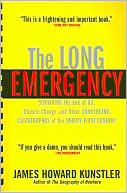
The Age of Oil is steadily dripping to a close, exposing the world to perils that we are ill prepared to counter, frequent New York Times contributor James Howard Kunstler maintains. According to this fervent jeremiad, the best has already been. The Long Emergency dismisses scenarios of emergent alternative energy sources and ticks off a list of harrowing impending disasters. A riveting, controversial wake-up call.
With his classics of social commentary "The Geography of Nowhere and "Home from Nowhere, James Howard Kunstler has established himself as one of the great commentators on American space and place. Now, with "The Long Emergency, he offers a shocking vision of a post-oil future. The last two hundred years have seen the greatest explosion of progress and wealth in the history of mankind. But the oil age is at an end. The depletion of nonrenewable fossil fuels is about to radically change life as we know it, and much sooner than we think. As a result of artificially cheap fossil-fuel energy we have developed global models of industry, commerce, food production, and finance that will collapse. "The Long Emergency tells us just what to expect after we pass the tipping point of global peak oil production and the honeymoon of affordable energy is over, preparing us for economic, political, and social changes of an unimaginable scale. Are we laboring under a Jiminy Cricket syndrome when we tell ourselves that alternative means of energy are just a few years away? Even once they are developed, will they ever be able to sustain us in the way that fossil fuels once did? What will happen when our current plagues of global warming, epidemic disease, and overpopulation collide to exacerbate the end of the oil age? Will the new global economy be able to persevere, or will we be forced to revert to the more agrarian, localized economy we once knew? Could corporations like Wal-Mart and McDonald's, built on the premise of cheap transportation, become a thing of the past? Will the misguided experiment of suburbia--considered a birthright and a reality by millions of Americans--collapse when the car culturebecomes obsolete? Riveting and authoritative. "The Long Emergency is a devastating indictment that brings new urgency and accessibility to the critical issues that will shape our future, and that we can no longer afford to ignore. It is bound to become a classic of social science.
The Long Emergency:
Surviving the Converging Catastrophes of the Twenty-first Century is a book by James Howard Kunstler (Grove/Atlantic, 2005) exploring the consequences of a world oil production peak, coinciding with the forces of climate change, resurgent diseases, water scarcity, global economic instability and warfare to cause chaos for future generations.
The book's principal theme explores the effects of a peak in oil production, predicted by many geologists, on American society as well as the rest of the world. In both this book and in his other writings, Kunstler argues that the economic upheavals caused by peak oil will force Americans to live in more localized, self-sufficient communities.
Kunstler's premise is that "cheap, plentiful" oil is the foundation of industrial society and the pervasiveness of its effects is not widely appreciated. Through the 21st century, oil and natural gas will become increasingly difficult to obtain, becoming increasingly expensive and ultimately unavailable. Scarcity of petroleum will cause significant problems for transportation and generation of electrical power. In addition, shipping of food and manufactured items will become increasingly expensive, ultimately prohibitively so. Also, natural gas is vitally important to food production as it is the raw material for much of commercial crop fertilizers. In the industrialized West, most food production and manufacturing is performed far from, and generally abstracted away from, the end consumer.
The author further argues that alternative sources of energy will be insufficient. As petroleum sources become scarce, environmentally harmful or risky technologies such as coal and nuclear will become necessary but not sufficient for our energy needs. Hydroelectric, solar, and wind power, even in combination with coal and nuclear, will also be far from sufficient. Kunstler does not consider hydrogen to be a true energy source since one cannot drill into the earth and obtain hydrogen. Hydrogen must be extracted from other energy sources, such as natural gas or using electricity at a total net loss of energy.
He states that as energy becomes scarce, transportation will become difficult or impossible, causing food and other necessary commodities to become unavailable in many communities. It will be necessary for local communities to become self-sufficient for food production, but many communities will be unable to do so, particularly large cities. The result will be mass starvation, disease, and civil unrest. Kunstler suggests that governments will be incapable of managing these problems. This period of scarcity and collapse will possibly last for hundreds of years, hence the "long" emergency of the book's title.
Kunstler, a long-time critic of suburban design, advises communities to change to accommodate walking and bicycling as the primary modes of transport. Populations should be moved out of big cities into smaller communities that have nearby arable land with adequate water and favourable climate for agriculture. People should begin learning to grow food.
The book: The Long Emergency: Surviving the End of Oil, Climate Change, and Other Converging Catastrophes of the Twenty-First Century » Barnes & Noble.com
